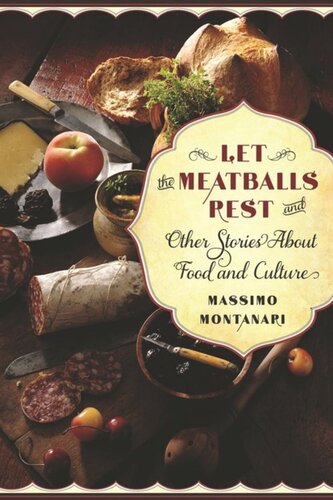

Most ebook files are in PDF format, so you can easily read them using various software such as Foxit Reader or directly on the Google Chrome browser.
Some ebook files are released by publishers in other formats such as .awz, .mobi, .epub, .fb2, etc. You may need to install specific software to read these formats on mobile/PC, such as Calibre.
Please read the tutorial at this link: https://ebookbell.com/faq
We offer FREE conversion to the popular formats you request; however, this may take some time. Therefore, right after payment, please email us, and we will try to provide the service as quickly as possible.
For some exceptional file formats or broken links (if any), please refrain from opening any disputes. Instead, email us first, and we will try to assist within a maximum of 6 hours.
EbookBell Team

4.1
80 reviewsKnown for his entertaining investigations into culinary practice, Massimo Montanari turns his hungry eye to the phenomena of food culture, food lore, cooking methods, and eating habits throughout history. Focusing on the selection, preparation, and mythology of food, Montanari traverses such subjects as the status of the pantry over the centuries, the various strategies of cooking over time, the gastronomy of famine, the science of flavors, the changing characteristics of convivial rituals, the customs of the table, and the ever-evolving identity of food. From the invention of basic bread making to chocolate's reputation for decadence, he positions food culture as a lens through which we can plot changes in historical values and social and economic trends. Montanari shows that cooking is not only a decisive part of our cultural heritage but also a key indicator of our material and intellectual well-being.
Known for his entertaining investigations into culinary practice, Massimo Montanari turns his hungry eye to the phenomenon of food culture, food lore, cooking methods, and eating habits throughout history. An irresistible buffet of one hundred concise and engaging essays, this collection provides stimulating food for thought for those curious about one of life's most fundamental pleasures.
Focusing on the selection, preparation, and mythology of food, Montanari traverses such subjects as the status of the pantry over the centuries, the various strategies of cooking over time, the gastronomy of famine, the science of flavors, the changing characteristics of convivial rituals, the customs of the table, and the ever-evolving identity of food. He shows that cooking not only is a decisive part of our cultural heritage but also communicates essential information about our material and intellectual well-being.
From the invention of basic bread making to chocolate's reputation for decadence, Montanari positions food culture as a lens through which we can plot changes in historical values and social and economic trends. Even the biblical tale of Jacob buying Esau's birthright for a bowl of lentils is a text full of essential meaning, representing civilization's important shift from a hunting to an agrarian society. Readers of all backgrounds will enjoy these delectable insights and their easy consumption in one companionable volume.